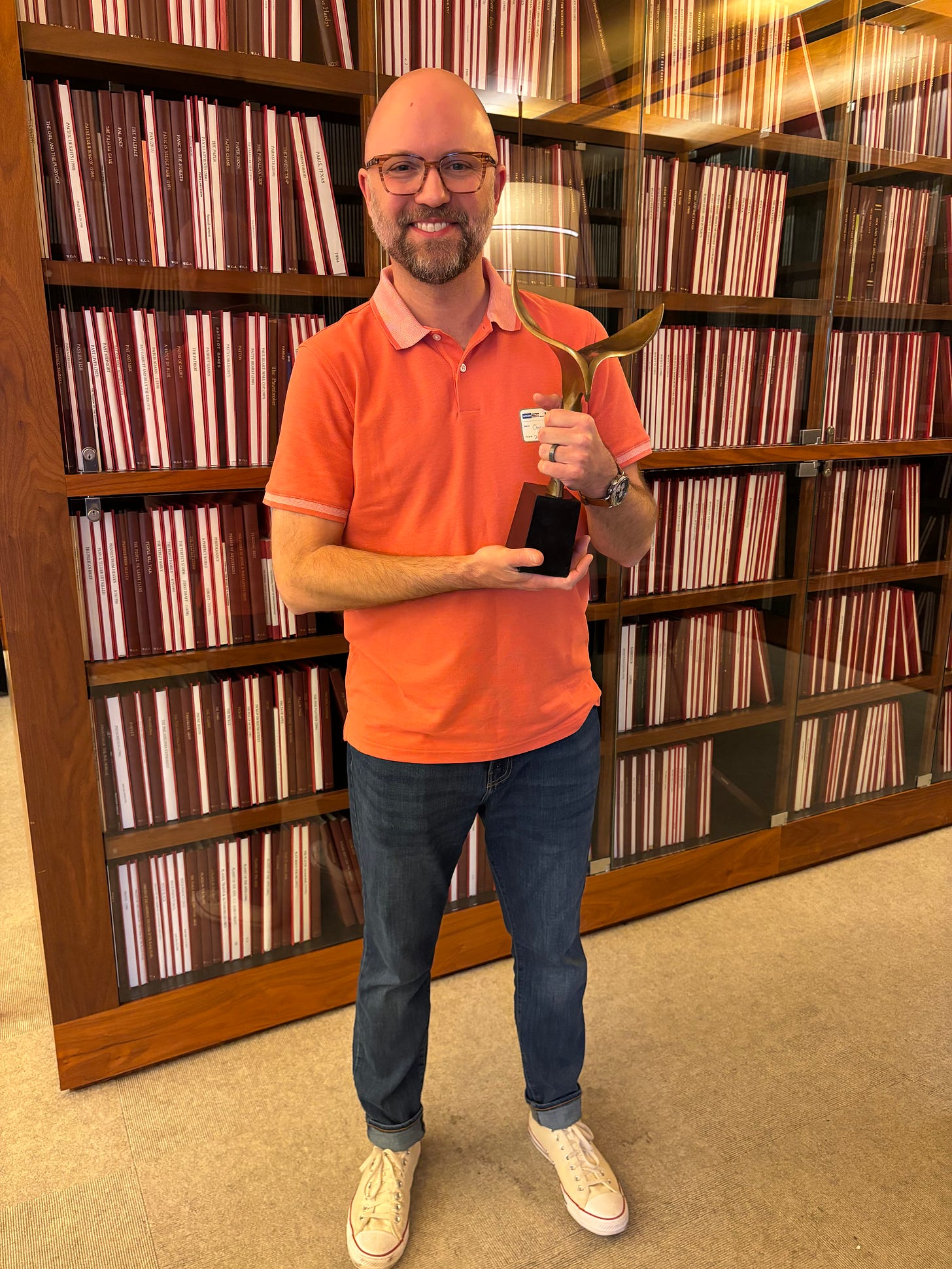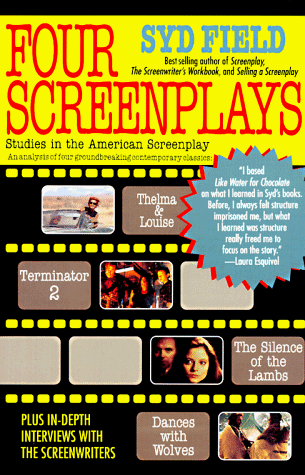My trip to the Writer’s Guild Library last week was something of an aspirational moment for me. Sure, I was there as a visitor rather than a member, and the WGA award I held was one for display and photographs rather than my own mantel, but it still felt like something that would have been merely a dream for the kid who once sat in his grandparent’s room, bored on a hot summer afternoon without air conditioning, scribbling cringeworthy dialogue into a cheap spiral notebook.
I started writing plays and screenplays at a very young age - twelve or thirteen years old, probably. Before that I wrote short stories and “novels,” even planning out elaborate book series that never came to be and were more than a little ripped-off from pre-existing properties (ask me sometime about Dave Hodge, the super spy who went on a series of globe-trotting adventures fighting against more and more outlandish, megalomaniacal villains). None of these were necessarily good, but I wrote them with a confidence, an abandon, and a lack of filter (or shame) that I’ve been trying desperately to recapture ever since.
I learned how to do it primarily by reading. It was mainlining Stephen King and Michael Crichton that “taught me” how to be a junior “novelist.” I likewise learned how to write scripts by getting my hands on some. There was a store called Media Play back in the 90s that sold books, movies, and music. Not a novel thing these days (aside from the fact that they actually still carried all of the above) but it was fairly mind-blowing to a media obsessed kid. Among their myriad offerings was a series of screenplays published by Premiere Magazine. These were printed on nice paper but bound in a fancier version of the kind of card stock that would house a draft lying on an agent’s or executive’s desk. The first one I remember buying was Star Wars. Even though this was a later, recognizable draft it still contained the deleted scenes with Biggs, something that rattled my whole concept of existence at the time - how could there be scenes written that didn’t end up in the movie?! This was only exacerbated when I picked up a copy of Ring Lardner, Jr.’s script for M*A*S*H and found that it bore only the most tenuous resemblance to what eventually ended up on screen.
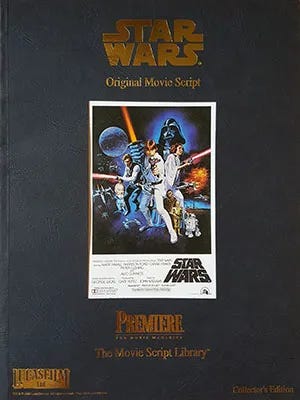
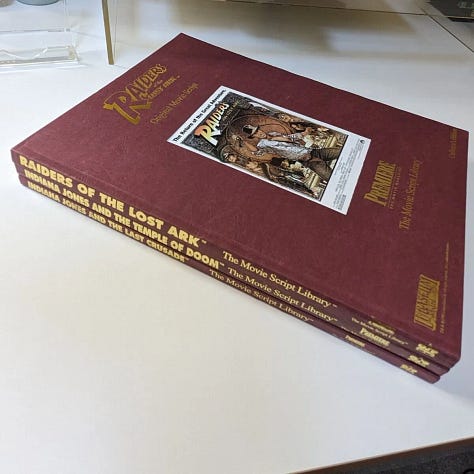
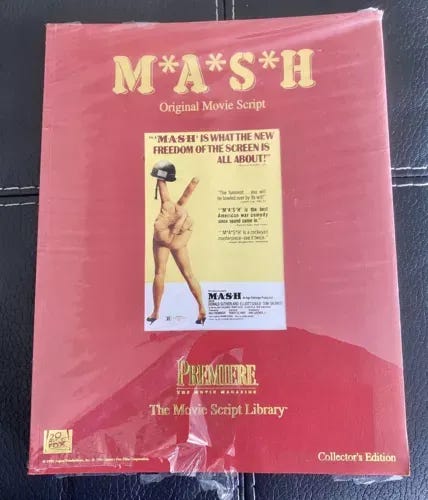
Over time I bought as many of these as I could, including the next two Star Wars movies, Raiders of the Lost Ark, and Indiana Jones and the Temple of Doom. I had these for years, and eventually got rid of them when I moved to Austin, Texas for a year and threw out everything that wouldn’t fit in my car. The only one I still have is It’s a Wonderful Life. It was my grandfather’s favorite movie, and he gave it to me shortly before he died (at that time the fog of age had transmogrified it in his mind into an original copy of the script, an illusion that in my gratitude I saw no need to dispel).
Truth to be told I have even earlier memories of seeing the published shooting scripts for Dracula and The Wizard of Oz. Dracula also contained a deleted scene - the original ending in which the Van Helsing character steps from behind a curtain after the closing title screen to speak directly to the audience, warning them that they shouldn’t leave the events they just witnessed behind in the theater because such things as vampires may actually exist. These films were so old that the format rendered them almost unreadable as anything other than verbal schematics, while the offerings from the Premiere Library more closely resembled the plays I had read in school or occasionally on my own.
The first book on screenwriting craft that I read was Syd Field’s Four Screenplays, in which the author of the original book on how to write a movie took four contemporary-at-the-time films and broke them down in terms of their story structure - specifically how they aligned with the three-act model that he introduced in his prior book. I didn’t read this because I wanted to learn, however - I read it because one of the movies he discussed was The Silence of the Lambs, which I was still at that time forbidden to see; reading this book was the closest thing I had to watching the movie, which meant that everything I learned about act breaks and plot points I came by completely incidentally.
I would later read Screenplay, Field’s original book, in a high school course on screenwriting taught not by a writer or film enthusiast but by a retiree on his second career, whose previous occupation had been guarding nuclear warheads and who had gotten slotted into our class when the original teacher left.
I would go on to read many many books on how write for the screen. I have a fairly complicated relationship with them. I think they often emphasize the wrong things, or end up by the very nature of preparing someone for the American film industry propagating a formulaic approach to writing, and don’t always encourage the kind of imaginative explorations that can really unlock something special in young or amateur writers. One of the advantages that the amateur has over the “professional” - or even the aspiring professional - is that they’re not bound by the same restrictions. While there are things they have to learn eventually, I think that starting from a place of inhibition and learning how to corral that situates one more successfully for interesting work than learning the restrictions first and then trying to play within those.
But maybe I’m just saying that because that’s how I did it.
Most of my learning has come from reading any and all screenplays I can get my hands on, watching as many movies as I can shove into my eyeballs, and reading any and every interview with writers and filmmakers I can stumble upon. I took writing classes in undergrad and grad school, though just as often in fiction writing and playwriting (a level of interdisciplinary experience which I also think helps one become a better - or at least more interesting - screenwriter). The most formal education in screenwriting I got was when I got my MFA in the subject, and even then it was largely (and blessedly) workshop-based.
At a certain point you realize that you’ve learned all you can learn by studying, and it becomes purely a matter of practice and refinement.
I’ve mentioned here before that I am currently co-writing a textbook in screenwriting. It’s been a challenging, but also enjoyable and interesting experience. I have realized that, in addition to synthesizing the nearly ten years of experience I have teaching it, that so much of my approach to writing about how to write has been shaped by how I learned to do it. My assumption - my hope - is that this will be one of the things that distinguishes our book from those already out there.
In addition to their library of screenplays, the WGA reading room also houses a vast collection of published screenplay books as well as just about every book ever written on the craft. I’m still working on the goal of getting a feature-length script produced, and thus one day having it archived (even if digitally) within the walls of the WGA library, available for future visitors to read through. But it’s also humbling and, frankly, kind of surreal to think that once my textbook is published, it will end up on those shelves, and that if nothing else that will be the mark I leave within that space for all of those who come after me.
It’s a pretty nice thought.
-cs





